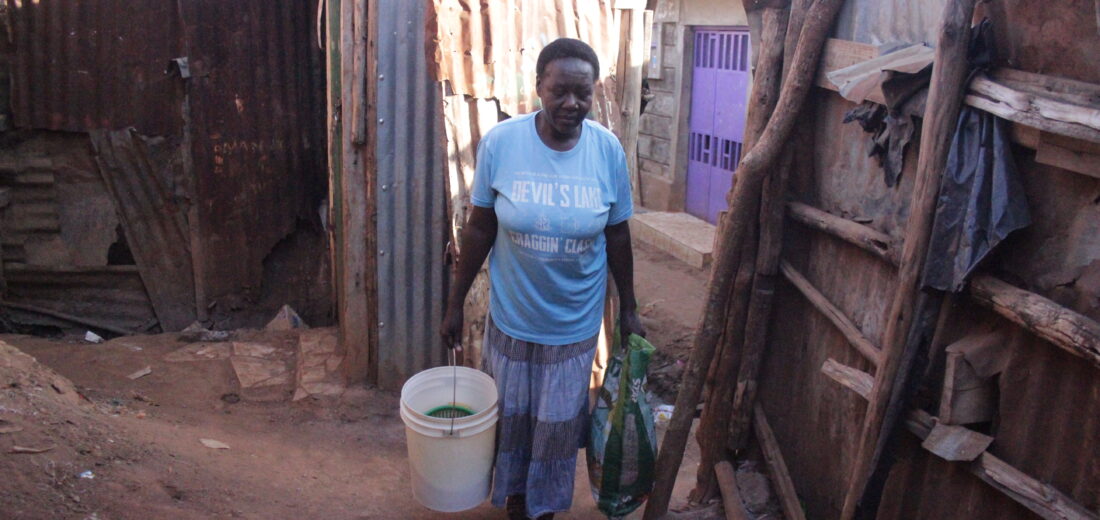
‘Education is the only inheritance I can give my children’
It is every parent’s dream to see their children get a quality education. Unfortunately, most children from low-income homes drop out of school because they can’t afford to pay fees, or buy uniforms, and school supplies. It is the same predicament Christine encountered, but thanks to her fish-selling business, her children are now able to enjoy the one privilege she never did. Getting an education.
In 2003 the then administration under the leadership of the late President, Mwai Kibaki, introduced free primary education in Kenya. It was a relief for parents who now only had to think about secondary school and probably university. Sadly, we are not out of the woods yet since there are still uniforms and school supplies that parents have to purchase. Vice Versa Global had a sit down with Christine Makongo, a single mother of three who resides in Kibra. She narrates how she navigates through tough economic times to educate her remaining daughter.
Mama Samaki
Christine Makongo was born and raised in Vihiga County in a family of eight – six sisters and two brothers. As their parents were not formally employed, she and her siblings struggled to get an education because their family relied on farm products. ‘As a first born I had high hopes of making it to secondary school but I had to drop out of class 8, which shattered my dreams,’ she says.

‘I got married when I was still young. As a young inexperienced woman, I could not cope with the hardship of life with my husband so I moved back to my parents but the situation only worsened. I had departed alone, but returned with two children,’ she says laughing. ‘I then decided to leave the village and head to Nairobi to stay with a friend in Kibra. I had to sweet talk my parents to let me leave my kids with them so that I could travel to Nairobi alone.’
‘When I got here, I never stopped thinking about my children’s education. I vowed that if any of my kids wanted to study, I would sacrifice all I could to ensure they got it. Even so, it wasn’t easy,’ she says. ‘Since I lived with a friend I had to find casual jobs and try to at least buy something for the house. Eventually, I landed a job as a housekeeper. The mistreatment in that house was awful. I remember I would work the whole day on an empty stomach. Since I didn’t want to go back to the village or let my two children lack education, I persisted. At the end of the first year, I got pregnant again for my third child who is now in form two.’
A domestic worker’s job is not permanent because when you become pregnant, your boss will just find another housekeeper. Initially, Christine wasn’t worried because she knew she had a husband and the suffering was over. Unfortunately, she found herself without a job or a husband, and with a baby to take care of. She had to look for casual jobs to keep up with the demands of her school-going children.
The Fish Business
‘One day a friend of mine came to my house and after hearing about my struggle, cunningly told me that I had to open a business. I quickly looked for funds and told her that I was ready and that was when she introduced me to the fish business. By then my daughter was five so leaving her behind with the neighbour’s children was not a problem. Slowly I started stabilizing and from paying rent of one thousand shillings (ten dollars), I was able to move to a house of 3,500 (35 dollars) a month.’
‘For ten years now I have been selling fish and I have no regrets. I go to the market either in Gikomba or Olympic every day. My business is not big but I am happy because if I take a loan, I can easily repay it. I can pay my bills and my daughter can do her shopping when she returns to school. The rest are married so she is the only one left,’ she says.
She admits that for the thirty years she has been in Kibra, life has never been easy. January is always the worst month for her since she has to worry about school. At the moment, her daughter is going to form two and she is worried about where she will get her school fees. ‘Last year I took a loan of 30,000 to take my daughter to school when she was joining form one. I am thinking of taking another loan.’

Motivation
‘Seeing my daughter at school makes me work extra hard every single day. Being that I was not privileged to attend secondary school, I want my daughter to study until she tells me it’s enough. I have to sell fish to pay my bills, school fees for my daughter, and other necessities. I didn’t give up hope even at the height of the pandemic when business was seriously affected. I sell small tilapia and am famously referred to as Mama Samaki. The way I prepare it makes my fish the most appealing, and you will be attracted to it even from afar. But the price of buying it is not favourable to us but we keep pushing.’
‘I have no property, house, or business that I can leave to my kids. The only thing I can do is educate whoever is willing. It’s the only inheritance I can leave them. That’s why I have been selling fish for ten years now. I have always told my children that if they want to study, I’ll provide the school fees – that’s a promise I made to them,’ Christine adds as she winds up.

Leave a Reply